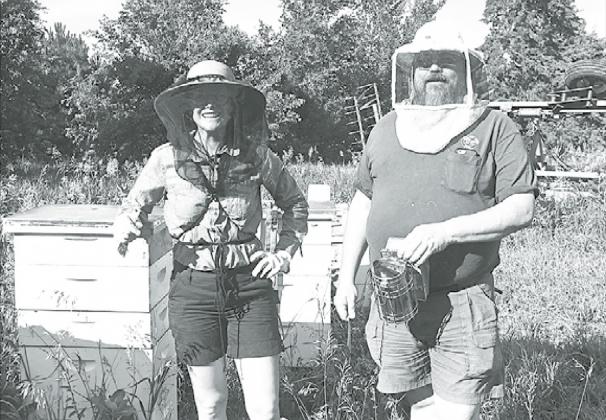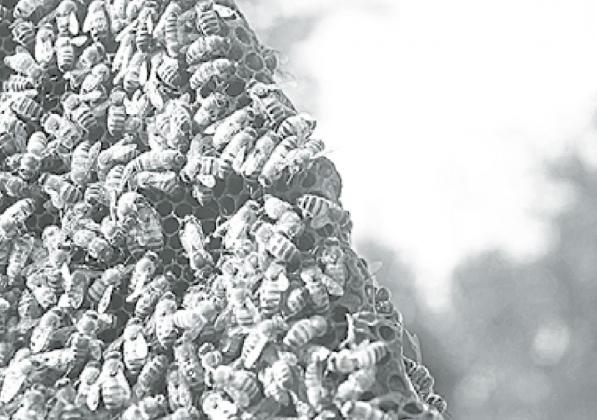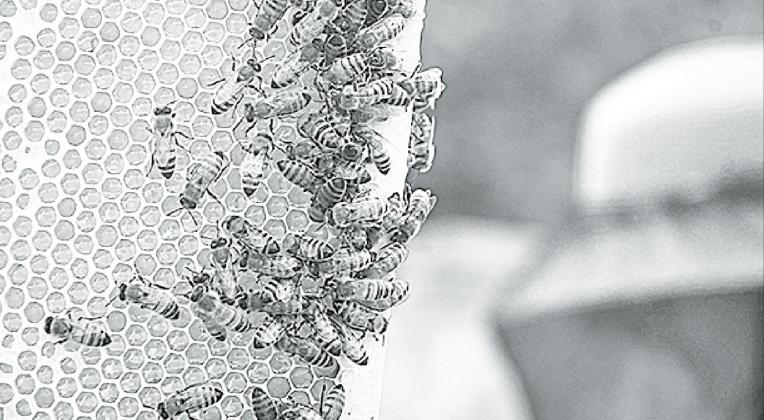Megan Vetter joins Brian Nilson to lead the group
The Nebraska Beekeepers Association has welcomed its new president, Megan Vetter. She joins vice president Brian Nilson on the board of directors to help support the state’s beekeepers.
Nilson knew Vetter through the beekeeping class they teach through the Grand Island Central Community College (CCC.) After “conning” her into helping at the school he has since “conned” her into being the president of the association.
The organization provides education about beekeeping and scholarship opportunities for 4-H participants in the state. Nilson noted that every year they support up to 10 scholarship children to get them started in beekeeping.
“We buy them one hive set up with bees,” he explained. “We give them a smoker, hive tool and gloves, 90 percent of what they need to keep bees. Our main thrust is that scholarship program. We’ve had two kids with the scholarship program through the Nebraska Beekeepers Association -- Blaine Bonifas and Carson Ott.”
In addition to supporting young beekeepers, the association hosts its Nebraska Beekeepers Fun Day every year in June. They explained that the day consists of speakers and scientists from different universities, though this year the event was done virtually due to the pandemic.
“For the beekeepers, we also have what we call our second Tuesday webinar,” Nilson said. “We have a speaker from somewhere in the country.”
To help fundraise for the group, they sell honey icecream at the Nebraska State Fair, as well as providing observation hives. “People can come up and
“People can come up and look at the bees under glass,” he explained. “That one event pays for almost everything we do during the year.”
As of the time this was written the bee exhibition was still planned for the fair, Vetter said. The association will have to wait for the health department and governor’s approval for the fair before knowing for sure.
Beyond educating the community about what bees do and how to support them, the association also works to rescue and protect bees when they swarm.
Nilson encouraged people to reach out to the association through e-mail, as all six board members can respond and help people with any bee issues.
Both of them voiced that they have been called to help a swarm of bees that has taken up residence where it is not safe.
“If you have a swarm don’t run out there with a can of raid yet,” she said. “It can be helped and beekeepers are excited to do that.”
Vetter noted that if people would like to support the association outside of the fair and their honey ice-cream they can become members for $15 a year.
“You can go to nebraskabeekeepers.org and find the membership
form,” she explained. “That’s one way. There’s also a Facebook group.”
The association is also in the process of attaining their nonprofit status. Once completed, they described that people can make donations directly on their website.
Beekeeping background
Looking back at how she got involved, Vetter found that she had always loved insects and had space at her home to keep bees.
“I was really interested in pollinating my apple trees and so I looked into mason bees for a bit,” she said. “Then I got the brochure from CCC and it had beekeeping 101. I signed up and I was so excited. When I got home from that first class I was like, ‘Okay where am I going to put my bees.’ I’ve just made it a really enjoyable passion.”
She noted that not only has she benefited from the hives, but her children have as well.
“It’s been great for my kids,” she said. “They will come out here and look for the queen.” Vetter has found that she
Vetter has found that she enjoys sharing her passion for bees with children and that fuels her love of teaching at CCC. In addition to teaching, she also sells the honey her bees produce as both a tasty treat and in the form of lotion bars.
Nilson recalled that he had been exposed to beekeeping through his cousin in California who has been a commercial beekeeper for more than 40 years.
“I was kind of interested in them, but I worked a job where I traveled all the time so I obviously wasn’t going to work with bees.”
When his father asked if he wanted to come home and farm, he decided to not only come back to become a farmer but to also try his hand at keeping bees of his own.
“In 2010 I got a hive of bees and promptly killed them that winter,” he recalled. “In the next year I got three hives of bees and killed them the next winter. Then I decided I better take a class and then I started having bees that survived. It kind of turned into an addiction. I’ve had as many as 150 hives. I’m back down to about 40 right now.”
Supporting the bees
Through their work with the Beekeepers Association, both Nilson and Vetter are striving to educate not only other beekeepers but the general population about what they can do to support pollinators.
One way that Vetter works to keep their population healthy is through the planting of a variety of flowers over the years.
“You realize that you need to feed them not just sugar syrup, but real nutritious floral variety,” she explained. “They really need 10-12
“They really need 10-12 floral sources to be working at any time of the year, to get a full balanced diet,” Nilson added. “They’re eating both pollen and nectar.” Vetter added that on her
Vetter added that on her property they grow large amounts of clovers and she has grown alfalfa for her bees as well.
“If you look at a Google Earth Map and you see those areas around here where you’ve got a three-mile area that’s nothing but cornfields then there’s almost no food for the honeybees there,” Nilson explained. “Lack of nutrition in a lot of areas around here is a big deal.” Both of them found that
Both of them found that through the work of creating a bee-friendly space, they also created a relaxing outside area to enjoy the quiet.
“It can be really relaxing to sit down off to the side of a hive and watch them come and go,” he said. “You’re watching their back legs and seeing what color of pollen the different ones are bringing in.”
“I walk around and take a lot of pictures of bees on flowers,” Vetter added. “I look forward to the dandelions because dandelions are bee’s friends. If anybody wants to know what could really help the bees out, it’s to leave your dandelions alone.”
She continued, noting that there are opportunities through the association where people can take classes just about wildflowers to learn what makes a good pollinator garden and what weeds to remove or keep.
“Beekeeping has actually made me more aware of the plight of a lot of other pollinators,” she said.
“The bumblebees, sweat bees, leaf-cutter bees and a lot of our native beetles and butterflies are having the problems the honeybees are having,” Nilson voiced. “The rusty patch bumblebee used to be common from Central Nebraska all the way across into Michigan. Now there are just a couple little pockets of them left.”
Both Nilson and Vetter added that anyone can be an ally to the pollinator population by planting more flowers and encouraging local plants to grow. As they have seen, every animal has its place in one way or another.
‘I look forward to the dandelions because dandelions are bee’s friends. If anybody wants to know what could really help the bees out, it’s to leave your dandelions alone.’
Megan Vetter
‘People can come up and look at the bees under glass. That one event pays for almost everything we do during the year.’
Brian Nilson







